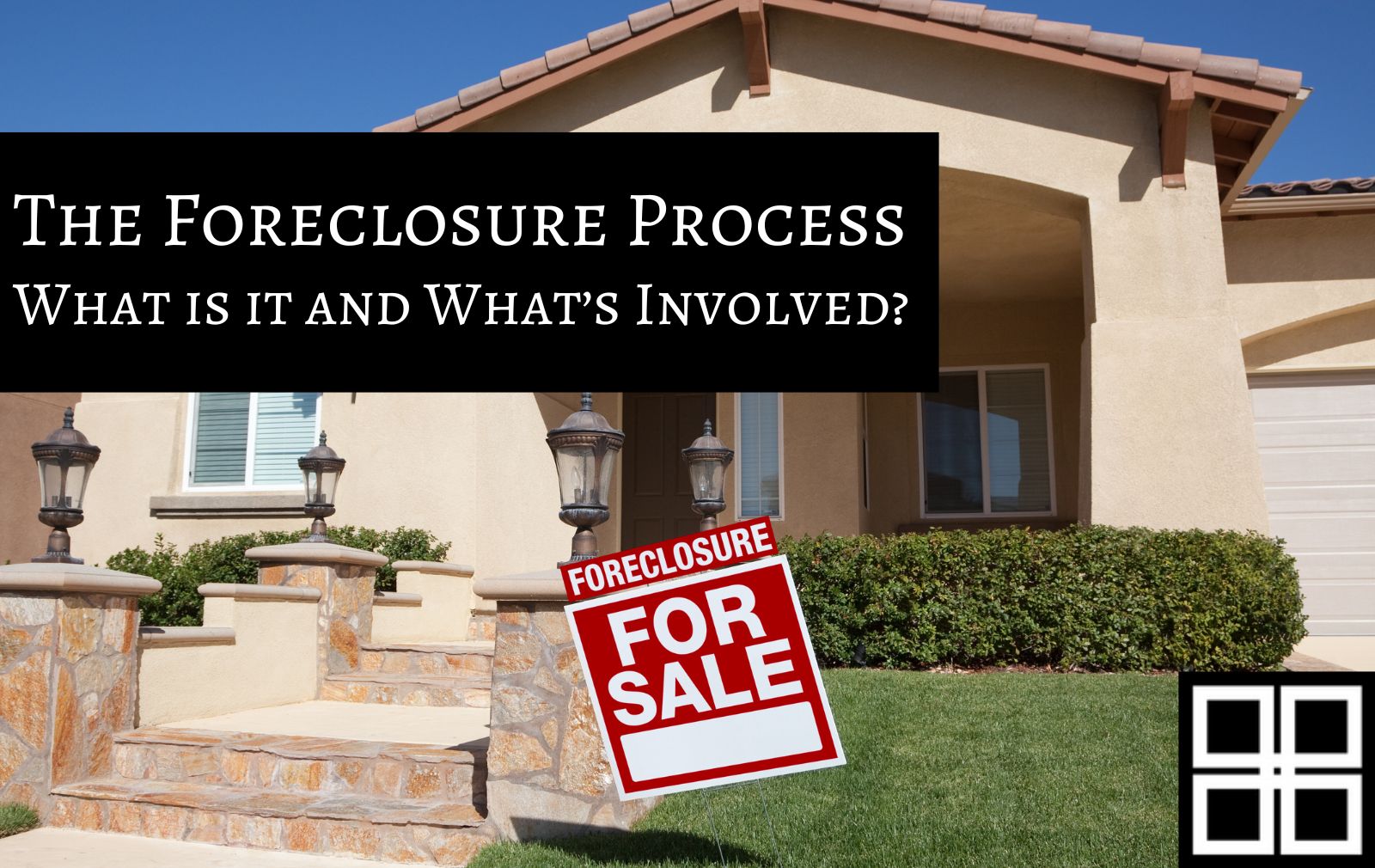The Foreclosure Process
The foreclosure process allows a lender to recover the money owed for a defaulted mortgage by selling the property or assuming ownership. The foreclosure process may vary by state but there are six phases that all foreclosure procedures follow.
What is foreclosure?
When a bank or mortgage lender seizes property in default against the will of the owner, it is called foreclosure. If you default on your mortgage, it is stated in your mortgage agreement that the bank may take possession of the property by foreclosure if you do not make payments.
The foreclosure process may be non-judicial or judicial, depending on the state. Some states offer both options.
- A judicial foreclosure is initiated by the lender who files a lawsuit. If the borrower loses, the foreclosure will occur and the home can be auctioned.
- Non-judicial foreclosures use power-of-sale clauses contained in mortgages or trust deeds to recover the debt if the borrower stops making payments. The process is generally faster and there is no court appearance. The mortgage clause allows trustees, who are appointed by lenders, to sell the house to pay the balance. To begin the foreclosure, the lender must follow the out-of-court steps outlined by the state as well as the mortgage agreement.
The Foreclosure Process
Phase 1: Payment default
A payment default is when a borrower misses at least one mortgage installment. The technical definition varies by lender. The lender will contact the borrower via letter or phone after a mortgage payment is missed.
Mortgage payments are usually due on the 1st of every month. However, many lenders allow a grace period up to the 15th. The lender will then charge a late fee and send a missed payment notice.
The lender will most likely call after the second missed payment. At this point, however, the lender might still be willing to work with the borrower to come up with a plan to catch up on payments. This may include just making one payment in order to avoid falling further behind.
The lender will send a notice of acceleration (or demand letter) to the borrower if they have not made a mortgage payment for three months. This letter will state the amount due and give the borrower 30 days to make the mortgage current.
If a mortgage is in default, it can be returned to good standing by being modified, or repossessed, sold or foreclosed.
Phase 2: Notice of default
After the fourth missed payment (90 days late), a notice of default is sent. This public notice allows the borrower to make up for past due payments within 30 days before the foreclosure process is officially started.
Most lenders won’t send a default notice until 90 days have passed (three missed payments in a row). Many times, a borrower will fall behind by a few months without having to worry about foreclosure.
Phase 3: Notice of Trustee’s Sale
The process of initiating foreclosure varies by state. In some states it is possible to do nonjudicial foreclosures, which only require filing the paperwork at the court. The foreclosure process can be accelerated. In other states, foreclosures are judicial. This means that each step of the process must be approved by a court.
The lender’s lawyer or foreclosure trustee schedules a property sale once the forms have been filed in court or the necessary approvals are met. The notice of trustee’s auction (also called a notice for sale) is recorded in the county of the property. It includes the time, location and minimum opening bid.
The lender is also required to advertise the property in general (newspapers, signs, etc.). In the weeks leading up to the auction, the lender must announce that the property is available for public auction (newspaper ads, signs etc.).
State-by-state, the time between the demand notice and the auction date can vary. It may be as little as two to three months. The borrower has up to the date of auction to make payment arrangements, or pay any amount due including the attorney fees that the lender incurred in order for the process to begin.
Phase 4: Trustee’s Sale
The property will now be put up for auction, and the winning bidder must meet all the criteria. The lender or firm representing the loan provider will determine an opening bid by calculating the value of any outstanding loans, liens, unpaid tax, and associated costs.
The winning bidder will receive a trustee’s deed of sale once the highest bidder is confirmed and the sale has been completed. The property becomes the buyer’s and the new owner is entitled to possession immediately.
Phase 5: Real Estate Owned (REO)
The lender will determine a minimum amount to bid that takes into consideration the appraised property value, the balance due on the mortgage and any other liens as well as attorney’s fees. When a home becomes real estate owned, the lender becomes the owner of the property if it is not sold at the public auction. They will then try to sell it through a broker, or with help from a REO asset manager. These properties are sometimes referred to by the term “bank-owned” and the lender will remove certain liens and expenses to make them more appealing.
Phase 6: Eviction
If the borrowers still live in the house, they will be given an order to leave as soon as the auction is over and the new owner has been named. This could either be the auction winner (if the property was not sold) or the bank. The eviction order demands that anyone living in the property leave immediately.
The occupants may be given several days to remove their personal belongings and move out of the property. The local sheriff will then visit the property to remove the occupants and any personal belongings.
Foreclosures and COVD-19 relief
If you don’t apply for the initial forbearance, but your loan is backed by the federal government, then you may be eligible for up to 12 months of forbearance.
There is no current deadline for applying for an initial forbearance if your mortgage is backed up by Fannie Mae and Freddie Mac. If your mortgage is supported by HUD or FHA, USDA or VA, the deadline for applying for initial forbearance will be September 30, 2021.

Foreclosure Questions and Answers
What is pre-foreclosure?
The pre foreclosure period is before the process of foreclosure begins. When you fall behind in payments, the lender will issue a Notice of Default (NOD).
What is REO foreclosure?
REO is real estate that has been foreclosed by a bank or lender, but failed to be sold at the foreclosure auction. The lender is the owner of the property.
What is a Deed In Lieu Of Foreclosure (DILF)?
Deeds in lieu of foreclosure is an instrument whereby a property owner willingly relinquishes their ownership to avoid foreclosure. It is usually less damaging than foreclosure.
Can I keep the profits from a foreclosure sale?
The lender does not have the right to receive any excess proceeds from the sale of a home over the balance owed on the loan plus any fees for the foreclosure. The borrower gets any extra money that is earned over the loan balance and foreclosure fees.
Do I owe money if my house sells for less than what I owe?
If your home is sold for less than what you owe, the lender may file a deficiency judgment. The borrower is required to pay the remaining loan amount in this lawsuit. If you owe $300,000.00 on your mortgage but the home only sells at $275,000.00, then the deficit is $25,000. The lender may try to collect any outstanding balance.
Nevertheless, some states have laws that restrict the use of deficiency judgements or those that prohibit them after foreclosure.
What property taxes do I owe when my house is in foreclosure?
As long as you own your home, you are legally required to pay property tax. In some cases, the lender will pay the taxes to sell the house. The government can seize property if taxes are past due. This makes it hard or impossible for lenders to recover what they owe. The tax burden is not on the person, but the home. Once the house has been sold, the new owner will be responsible for the taxes.
Lenders may pay the tax bill upfront and then send the owner a statement to recover their costs. Some states don’t allow lenders to collect on payments they made after a foreclosure.
What happens if my house is in foreclosure?
In general, you don’t have to leave your house until the foreclosure is completed, which could take several months, or even a whole year. Once your home is sold, however, you must leave. State laws may vary, but you might be able to stay in your home for a period of time after the date of sale. You may have a few days to a couple of weeks.
The homeowner or lender may initiate a formal eviction if you stay on the property beyond your legal right.
How can I stop the foreclosure process?
There may still be time to stop the foreclosure process before your home is auctioned. Communication with your lender is key. It is best to contact your lender as soon as possible. Some people are afraid to call their lender. They would rather avoid the uncomfortable situation and put it off. But this can hurt you over time.
Most lenders understand that financial difficulties are not uncommon. You may be asked to provide proof of financial information in order to work out a plan. Other government agencies offer counseling and assistance. One of these is Making Home Affordable.
You should be on the lookout for scammers who prey upon desperate homeowners. Verify that the number they are calling you from is one you can trust. You can find a housing counselor by visiting the U.S. Department of Housing and Urban Development (HUD)’s website.
If someone approaches you and asks for money to fix a problem quickly, it may be a scam. Call your local elected official to find out what assistance is available. Do not give any money.
The Bottom Line
Many lenders will try to work with the borrower during the foreclosure process to help them catch up on their loan payments and avoid foreclosure. It is worth contacting the lender if there is any chance that the borrower will be able to catch up with payments, for example if they have just started working after a period of being unemployed. After all, if you are already behind on your payments, negotiating with your lender can’t hurt.










